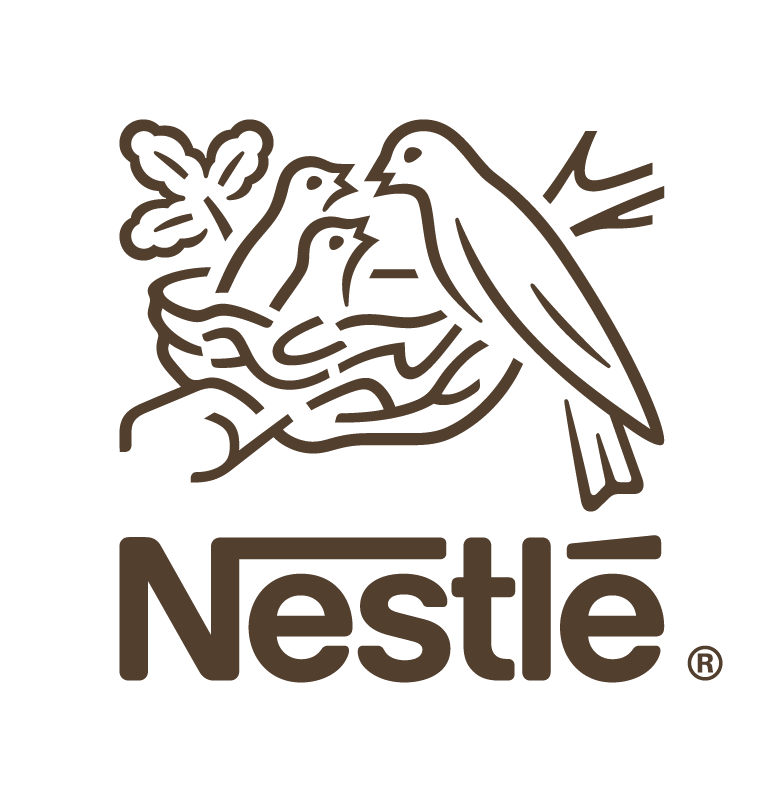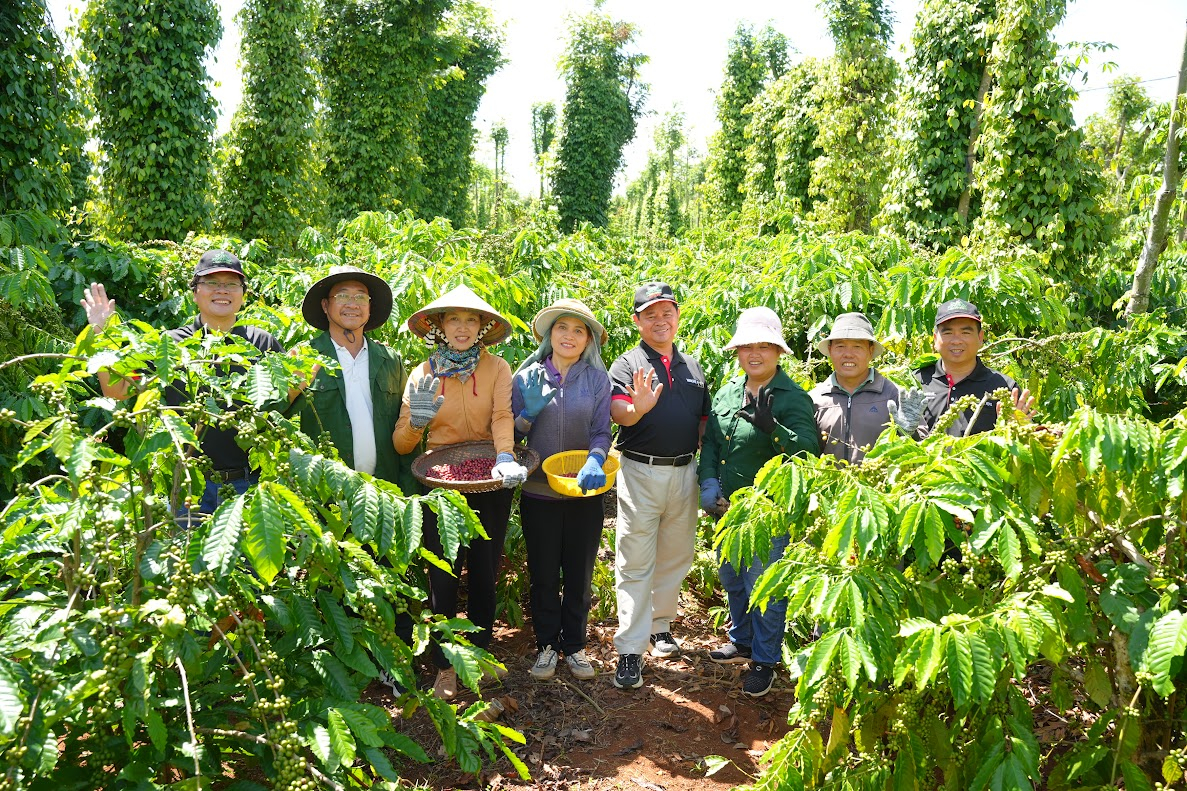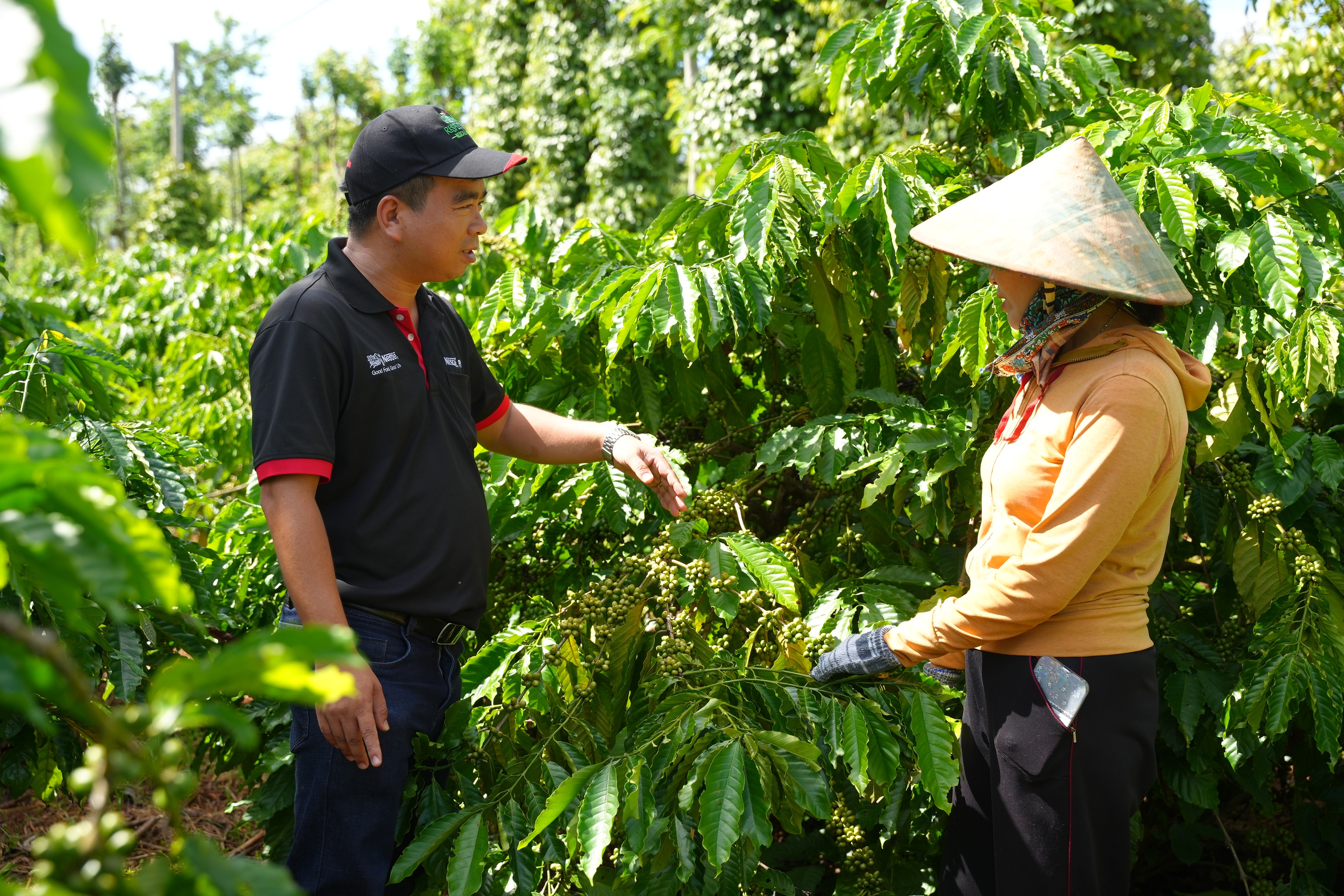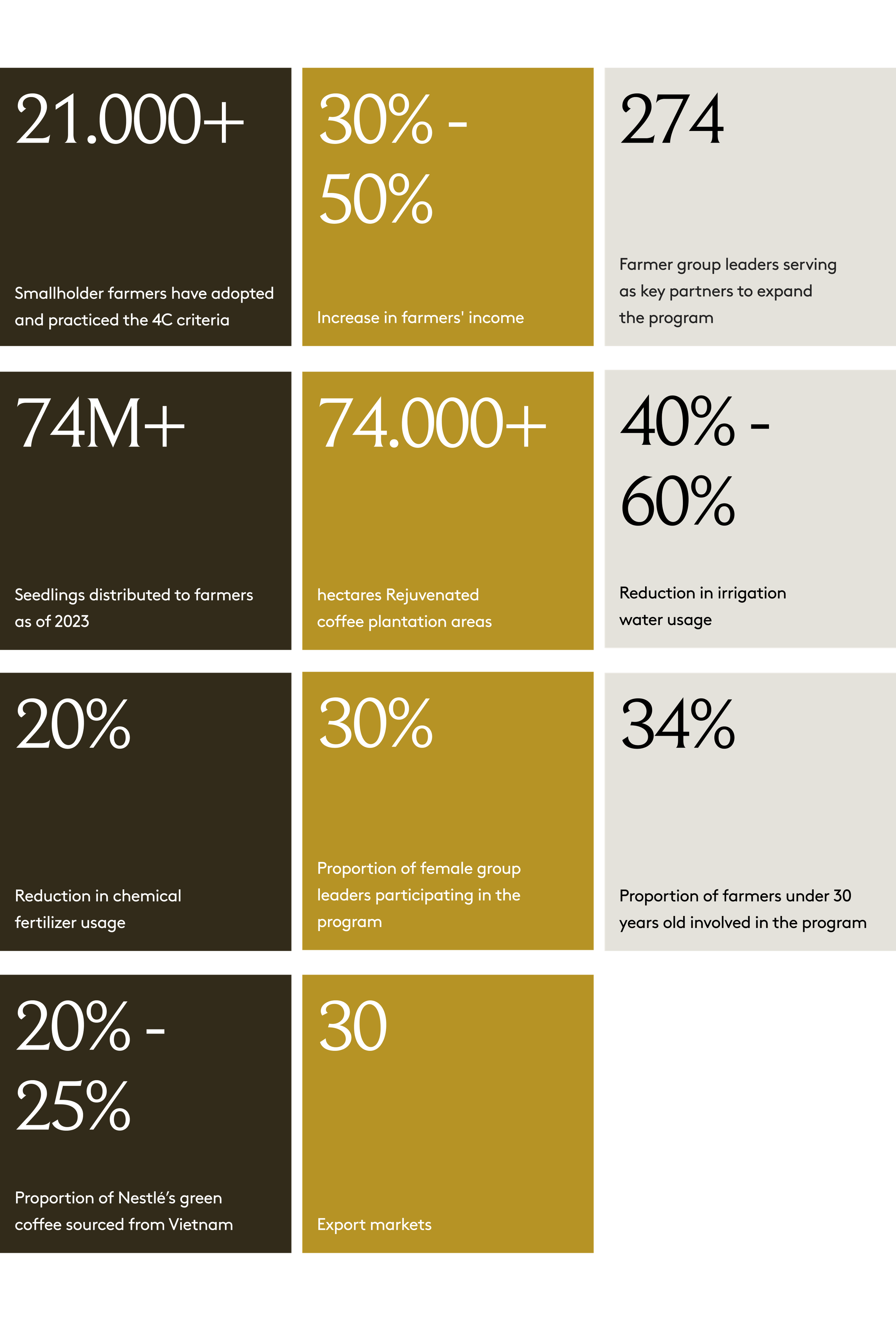NESCAFÉ Plan - Support farmers in transition to regenerative agriculture for sustainable and thriving coffee farming communities
Showcase Library
26/11/2024 09:55
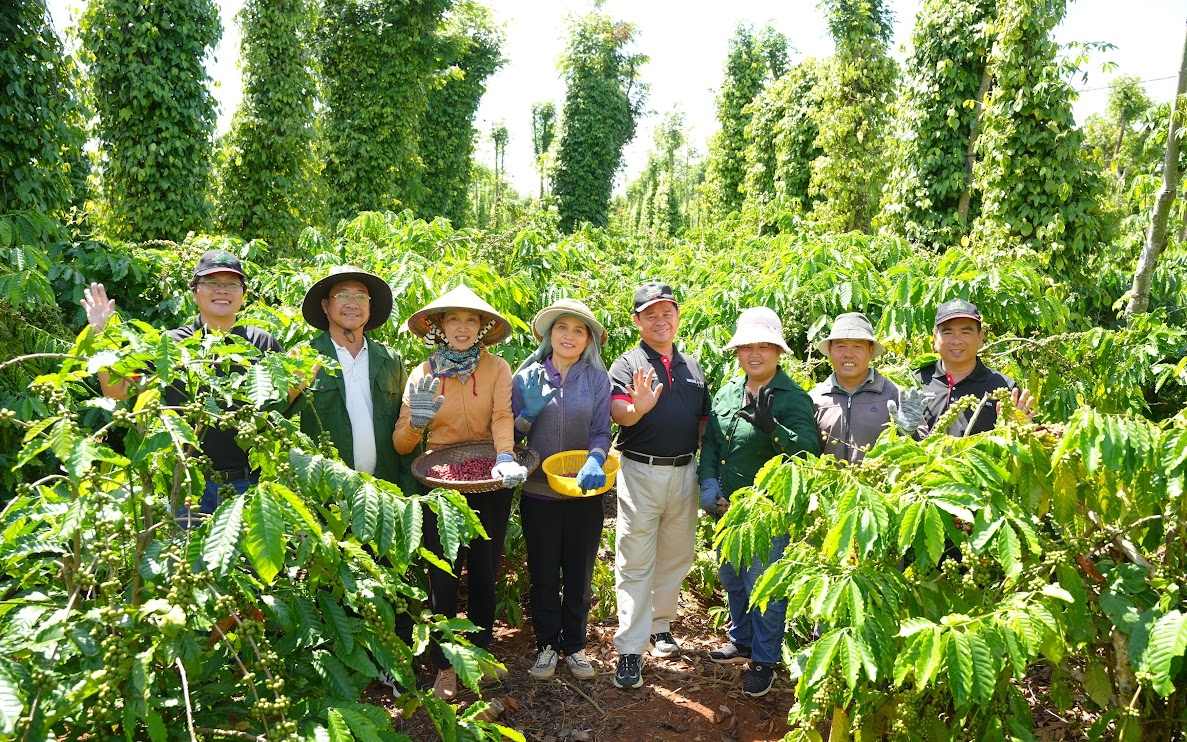
Implementing agencies
-
Category
PROJECT
-
Date time
FROM 2010 TO PRESENT
-
Field
RESPONSIBLE CONSUMPTION AND PRODUCTION
The NESCAFÉ Plan is a global initiative launched by the Nestlé Group in 2010, spanning more than 15 countries in key coffee-growing regions worldwide. In Vietnam, the NESCAFÉ Plan has been implemented in the Central Highlands provinces since 2011. This long-term program, based on multi-stakeholder collaboration with the Ministry of Agriculture and Rural Development, the Central Highlands Agricultural Extension Center, and the Western Highlands Agricultural and Forestry Science Institute (WASI), aims to assist farmers in building regenerative agriculture, with objectives to: comprehensively improve farmers' livelihoods; support the transition of coffee cultivation towards low emissions and climate resilience; and contribute to Nestlé's broader goal of achieving net zero emissions by 2050. After more than 13 years of implementation, the program has made significant achievements, particularly in improving and enhancing the livelihoods of thousands of farmers in the Central Highlands region.
Part 1
Starting background of the project
Central Highlands coffee is a symbol of the Vietnamese coffee industry, known and loved by people both at home and abroad. Over the centuries, coffee trees have become a source of pride and an indispensable part of the lives of Central Highlands farmers.
Despite being the world's second-largest coffee exporter and the leading Robusta coffee producer, Vietnamese coffee farmers face numerous challenges that negatively impact the productivity and quality of coffee beans. These issues, in turn, affect farmers' income, livelihoods, quality of life, and the sustainable development of the coffee industry. These challenges arise both from internal industry limitations and external environmental factors, including:
- Outdated farming practices based on tradition rather than scientific knowledge, such as premature picking, improper processing, overuse of pesticides and chemicals, excessive application of fertilizers, and inefficient irrigation, which reduces the quality of flowers and beans. Farmers also engage in inappropriate monoculture or intercropping.
- Short-term and seasonal farming habits that are easily influenced by market fluctuations, leading farmers to cut down long-term crops to replace them with short-term, fast-yielding ones.
- Climate change-induced challenges, including extreme weather patterns like prolonged droughts, water shortages, and erratic storms and floods, which severely affect coffee cultivation and production, disrupting the entire supply chain.
- The increasing area of aging coffee trees. In the Central Highlands provinces alone, approximately 30-40% of the coffee-growing area—equivalent to 180,000 to 240,000 hectares—needs replanting each year. However, resources for replanting these coffee gardens remain limited.
- A lack of successor farmers and agricultural labor due to the trend of younger generations moving to urban areas for work and choosing not to return to rural areas after completing their education.
Vietnam is a key supplier in the global coffee market, and its coffee industry contributes significantly to the national economy through exports. In recent years, however, regulations on sustainability in major coffee-importing markets have become increasingly strict, transitioning from voluntary guidelines to mandatory requirements. These include stricter rules on residues of plant protection chemicals and sustainable sourcing regulations (such as farming without causing deforestation, and supply chains that meet human rights, labor, and environmental protection standards). As a result, exporting coffee has become more challenging.
This context presents an urgent need for Vietnamese farmers and the coffee industry to adapt and develop a comprehensive strategy for sustainable growth. For Nestlé, Vietnam remains one of the key countries providing global coffee supplies. The Group purchases an average of 20% to 25% of Vietnam's green coffee output annually to meet both domestic demand and export needs. To create shared value for coffee farmers and the Vietnamese coffee industry, and to build a responsible and sustainable supply chain, Nestlé officially launched the NESCAFÉ Plan in Vietnam in 2011.
After more than a decade of working alongside farmers, the NESCAFÉ Plan has introduced technical innovations and new technologies that have positively impacted the lives and livelihoods of coffee farmers, as well as the environment and the sustainable development of Vietnam's coffee industry. In 2022, Nestlé launched the NESCAFÉ Plan 2030, accelerating the Program's progress over the next decade and reinforcing its ambition and commitment to supporting farmers in transitioning to sustainable coffee cultivation using regenerative agriculture methods. The solid foundation of achievements gained over the past decade motivates the NESCAFÉ Plan to continue its journey toward a more sustainable and better future for farmers and coffee-growing communities in Vietnam and other key countries targeted by the Program.
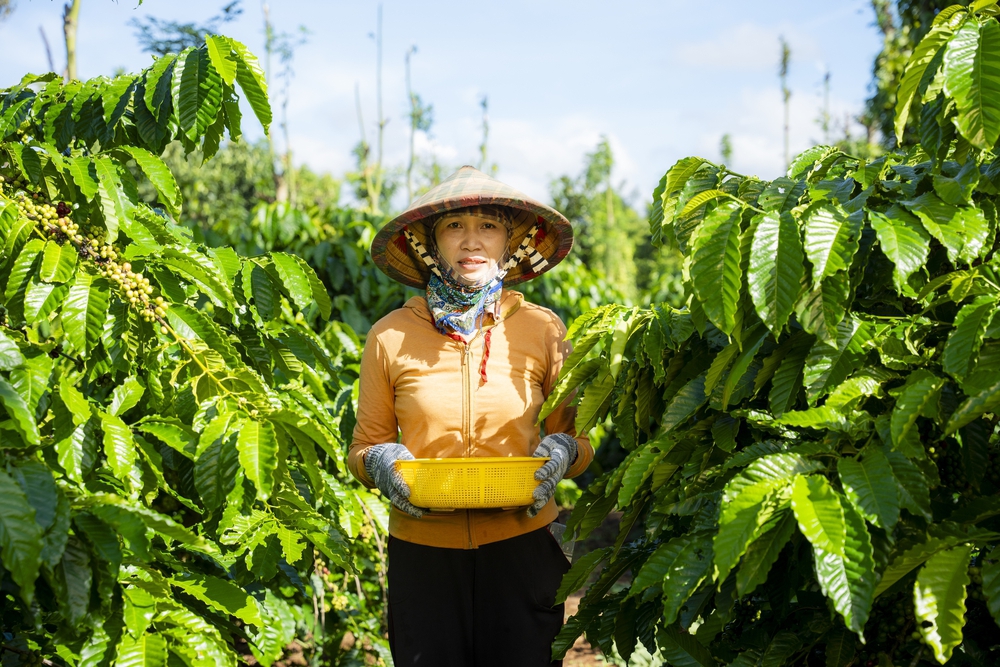

Part 2
Project innovation/ invention
Regenerative agriculture, a farmer-centered approach, aims to enhance soil quality and fertility, protect water resources, and promote biodiversity. This method can positively impact the foundation for sustainable food production and contribute to combating climate change. In Vietnam, Nestlé is a pioneer in implementing regenerative agriculture through the NESCAFÉ Plan program. Nestlé's comprehensive regenerative agriculture model focuses on three key resources of the agricultural system: land, water, and biodiversity. Moreover, Nestlé identifies farmers as the central element of the model, as they are responsible for managing resources and making decisions tailored to their specific circumstances.
To this end, the team at Nestlé Vietnam collaborates with scientific organizations and agricultural experts to support farmers in transitioning to regenerative farming practices through specific actions:
- Soil Conservation and Health: Soil fertility and quality are crucial for coffee plants to absorb nutrients and thrive. Therefore, the Program prioritizes the use of natural cover crops, weeding by machine or hand instead of pesticides, and using grass as mulch. It limits chemical fertilizers and replaces them with microbial compost made from coffee husks and livestock waste to minimize soil impact.
- Water Resource Protection: Nestlé's team guides farmers in applying water-saving irrigation solutions using simple techniques and tools. This approach reduces the amount of irrigation water used while ensuring the quality of coffee beans and the productivity of coffee gardens. It protects precious groundwater resources, helping farmers adapt to climate change's effects on agricultural production, especially in the coffee sector.
- Biodiversity Protection: The program supports farmers in implementing sensible intercropping models that combine timber trees and fruit trees, such as pepper and avocado, with coffee. This strategy provides additional sources of income and creates shade and protective barriers around coffee gardens.
Alongside these key activities, the NESCAFÉ Plan also emphasizes improvements and innovations in coffee cultivation through the following efforts:
- Research and Development of High-Yield Coffee Varieties: These varieties are resistant to pests and diseases and drought-tolerant, distributed to farmers through a collaboration program with WASI.
- Digital Farm Management Tools: Nestlé develops digital tools to help farmers manage their farming activities more effectively. This enables farmers to take control of their household economies while providing Nestlé with quick data for effective monitoring and management of the Program.
- Greenhouse Gas Emission Reduction in Coffee Cultivation: Nestlé collaborates with international organizations to conduct greenhouse gas emission inventories in coffee farming, aiming to minimize emission rates in coffee production.
+ Phase 1 (2011 - 2021): Documenting total emissions related to producing a unit of green coffee (kg or ton) while conducting geospatial analysis that integrates supply chain data with overlays of other spatial datasets (e.g., forest cover, deforestation hotspots, degraded areas) to identify potential restoration opportunities and off-farm interventions.
+ Phase 2 (2022 – 2025): Actively intervening with a comprehensive approach focused on soil quality, water conservation, and biodiversity through practices that promote regenerative agriculture (cover crops, crop rotation and diversity, mulching, reduced tillage, organic fertilizers, irrigation technology, buffer zones, integrated nutrient management, intercropping, agroforestry, grassland management, hedgerows, integrated pest management, smart farming, compost processing and preservation, livestock management, and holistic grazing strategies).
Over nearly 30 years of establishment and development, Nestlé Vietnam has consistently committed to long-term investment and contributing to the sustainable development of Vietnam. Our vision is to become a globally connected company that leads in sustainable development. Guided by values rooted in respect, we collaborate closely with our partners to create shared value for all stakeholders. This means contributing to society while ensuring the long-term success of our business. We refer to this approach as "Creating Shared Value" (CSV), which is integrated into all our business operations. This is also the method employed by the NESCAFÉ Plan, aimed at creating sustainable social, economic, and environmental value for businesses, farmers, coffee-growing communities, and the planet:
- Integrating Social Goals into Business Strategy: By positively impacting the Vietnamese coffee industry, contributing to environmental protection, improving farmers' livelihoods, and fostering economic development in rural areas, the NESCAFÉ Plan initiative also offers strategic benefits to Nestlé. Through this program, the company can ensure a stable and high-quality coffee supply to meet rising production demands.
- Building Sustainable Partnerships with Stakeholders: To ensure the Program's success, we collaborate with various entities, including the Ministry of Agriculture and Rural Development, the Agricultural Extension Center of the Central Highlands provinces, and WASI.
- Long-Term Investment in Communities for Sustainable Business Development: The NESCAFÉ Plan is a long-lasting initiative that reflects Nestlé's social responsibility, directly contributing to its sustainable development goals, including a commitment to halve greenhouse gas emissions by 2030 and achieve net-zero emissions by 2050.
- Transparent Measurement and Communication of Results: Nestlé Vietnam publishes specific data on the NESCAFÉ Plan's results at each phase, fostering trust and support from the community and partners, and optimizing the impact of the CSV strategy.
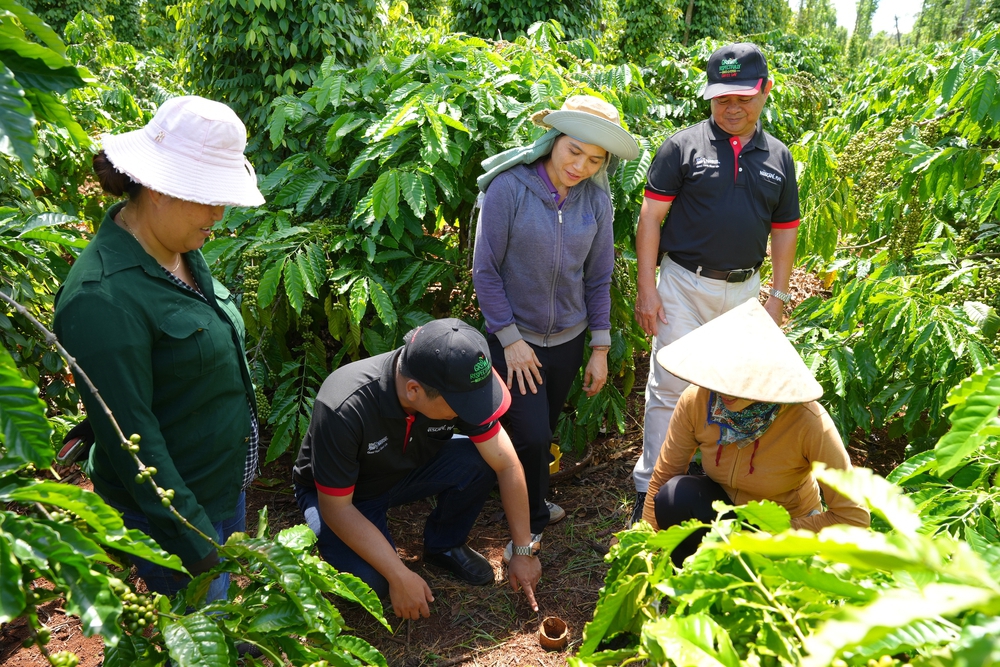
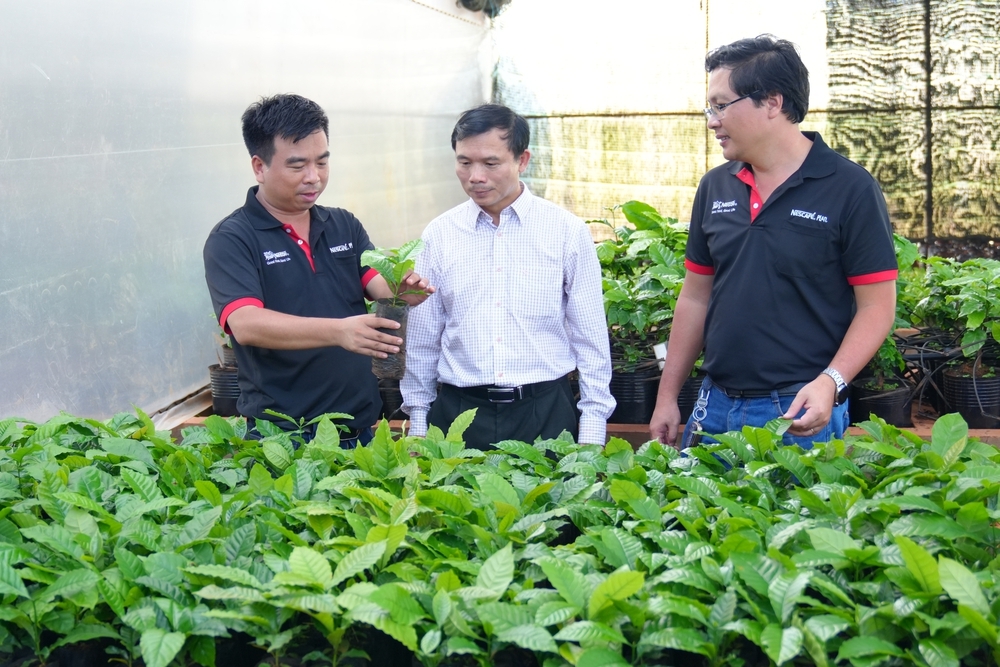
Part 3
Goals and vision of the project
Goals
Thirteen years ago, recognizing the limitations and challenges faced by the Vietnamese coffee industry, which adversely affected productivity and the quality of coffee beans, the NESCAFÉ Plan was launched with several key objectives:
- To implement numerous technical improvements and adopt new technologies, creating a positive impact on the sustainable development of the Vietnamese coffee industry, with the goal of developing a low-emission and climate-resilient sector.
- To enhance livelihoods, contributing to improved quality of life for local farmers and fostering a prosperous coffee-farming community.
- To elevate the quality and value of Vietnamese coffee beans, ensuring a delightful coffee experience for generations of Vietnamese consumers, thereby establishing Vietnam as a benchmark for Robusta coffee worldwide.
After more than a decade of dedicated efforts in sustainable coffee development, the NESCAFÉ Plan has achieved significant successes. This also laid the groundwork for Nestlé to announce the NESCAFÉ Plan 2030 in 2022, with even more ambitious goals. The initiative will continue to support farmers in the transition to sustainable coffee cultivation through regenerative agriculture, focusing on over 15 key countries and regions, including Vietnam, with a total investment of CHF 1 billion by 2030 from Nestlé for the global NESCAFÉ Plan. The specific targets are as follows:
By 2025:
- 100% of Nestlé's coffee will be responsibly sourced.
- 20% of Nestlé's coffee will come from regenerative farming practices.
By 2030:
- 50% of Nestlé's coffee will be sourced from regenerative farming practices.
- CO2 emissions will be reduced by 50%.
Key Focus Areas of the NESCAFÉ Plan 2030:
Supporting farmers in transitioning to regenerative farming practices
The program will continue to provide training and technical support to farmers cultivating high-yield coffee to facilitate their transition to regenerative agriculture, focusing on three primary objectives: improving soil health and fertility, safeguarding water resources, and preserving biodiversity.
Concentrating program resources in regions where NESCAFÉ sources 90% of its coffee
The program team will collaborate with coffee farmers to test, research, implement, and evaluate the effectiveness of regenerative agricultural practices. This will be prioritized in seven regions where NESCAFÉ sources approximately 90% of its green coffee, including Vietnam (along with Brazil, Mexico, Colombia, Côte d'Ivoire, Indonesia, and Honduras). The targets to achieve are:
- 100% sustainable coffee sourcing by 2025.
- 20% regenerative coffee sourcing by 2025.
- 50% regenerative coffee sourcing by 2030 as part of Nestlé's global commitment to sourcing critical raw materials.
Reducing greenhouse gas emissions through enhanced carbon sequestration in the soil
NESCAFÉ aims to contribute to Nestlé's Net Zero commitment, which seeks to halve greenhouse gas emissions by 2030 and achieve net zero emissions by 2050. The program will work with farmers, suppliers, and partners to protect agricultural land, enhance biodiversity, and prevent deforestation; it also plans to assist farmers in planting over 20 million trees on or near Nestlé coffee farms globally, including in Vietnam.
Piloting a financial support program for several countries implementing the NESCAFÉ Plan
The NESCAFÉ Plan is committed to assisting farmers in managing the risks and costs associated with transitioning to regenerative agriculture. Consequently, NESCAFÉ Plan will develop specific programs aimed at improving farmers' incomes during this transition. Additionally, through a monitoring and evaluation system in collaboration with the Rainforest Alliance and other partners, the project will closely track progress and assess the income achieved by coffee farmers to ensure the effectiveness of the on-ground programs.
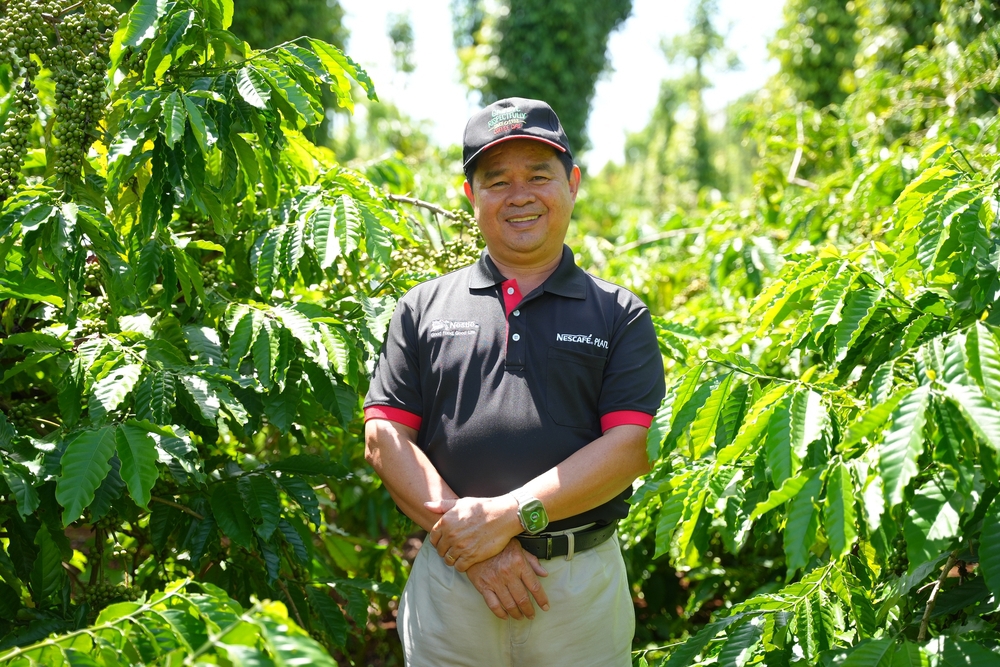
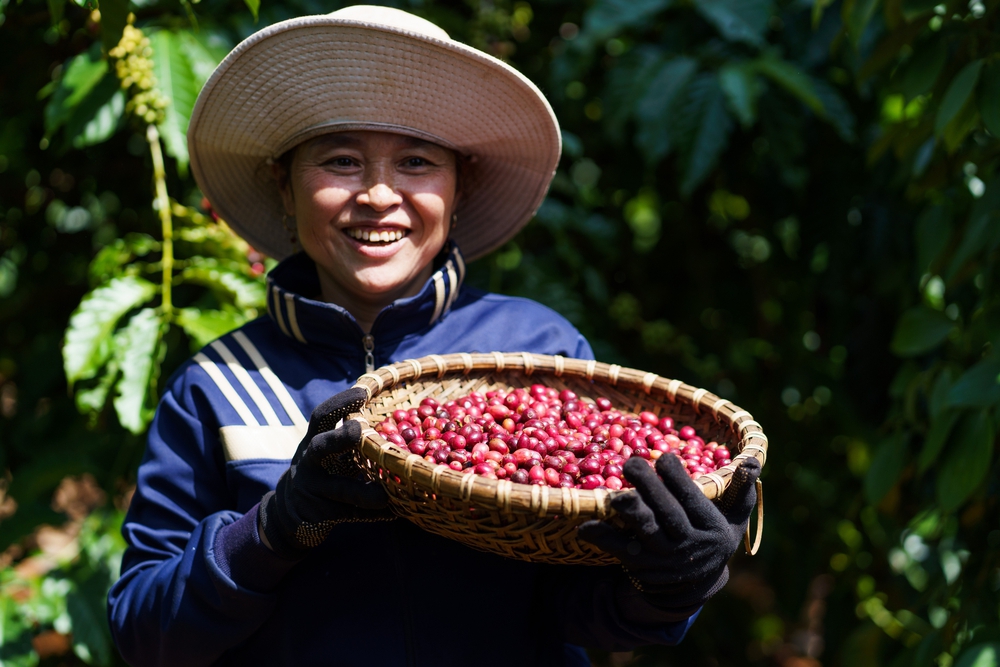
Vision
With the NESCAFÉ Plan 2030, the Nestlé Group demonstrates its vision of comprehensively supporting farmers in the transition to regenerative agriculture. The solid foundation built on the significant achievements of the past decade fuels our confidence in the path ahead for the NESCAFÉ Plan as we continue our journey of sustainable development, working towards the establishment of a regenerative coffee industry and accelerating project progress over the next decade to address climate change and the social and economic challenges within our value chain.
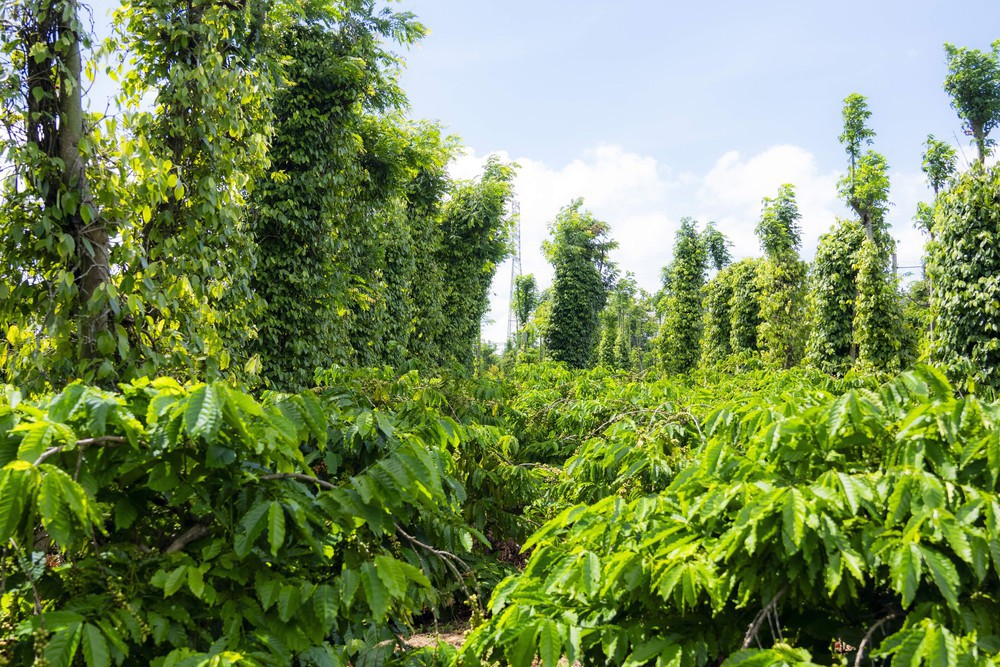
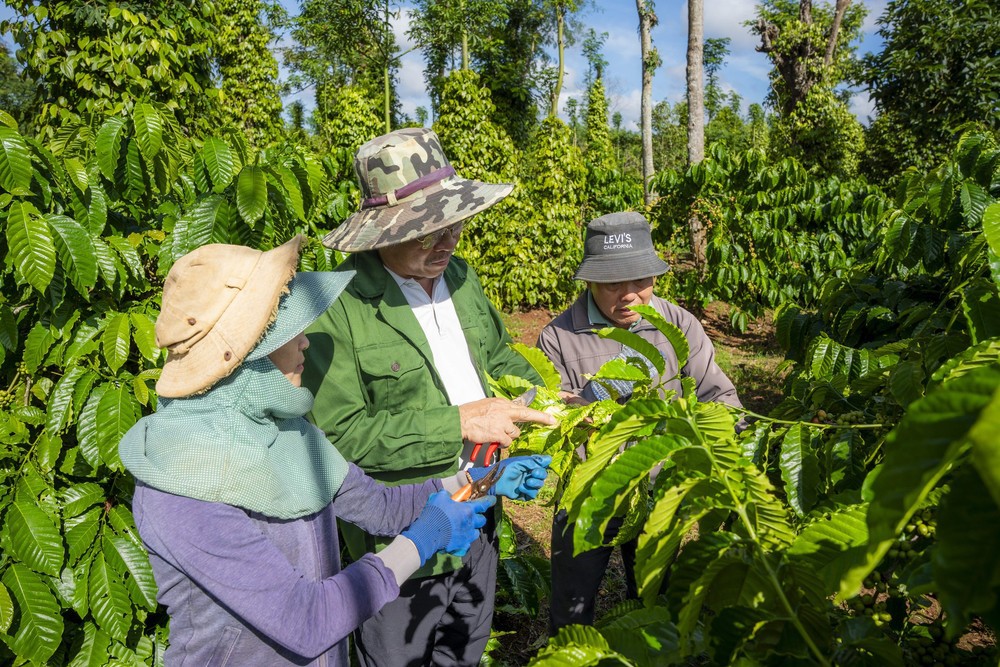
Part 4
Implementation - Scope - Cost of the project
- 2010: The global initiative NESCAFÉ Plan was launched by the Nestlé Group.
- 2011: NESCAFÉ Plan was officially implemented in Vietnam, piloting in three provinces: Dak Lak, Lam Dong, and Dak Nong.
- 2012: NESCAFÉ Plan was further expanded in Gia Lai province, extending its reach to key coffee-growing areas in the Central Highlands, including Dak Lak, Dak Nong, Gia Lai, and Lam Dong provinces.
- 2015: The FARMS and FFB (Digital Farmer's Diary) software was introduced to manage the direct data of each farm, providing timely support to individual farmers.
- 2019: Received a certificate of merit from the Ministry of Agriculture and Rural Development for outstanding contributions to the Vietnamese coffee industry and for advancing sustainable agriculture through the public-private partnership (PPP) model, thereby contributing to rural agricultural development.
- 2021-2024: Collaboration with the International Labor Organization (ILO) has been ongoing to implement training programs and replicate best practices in Occupational Safety and Health (OSH) and the Labor Law.
- 2011-2024: The implementation of a reasonable intercropping model has assisted farmers in increasing their income by 30% to 100% per unit area.
Since its implementation in Vietnam, the NESCAFÉ Plan has established a team of eight agricultural support staff to manage and oversee field activities alongside farmers. In addition to the agricultural personnel, the program has developed and trained a network of 274 farmer group leaders, who serve as vital links in disseminating knowledge and fostering connections within the community. Each farmer group collaborates to replicate effective and sustainable farming models while establishing a mutual monitoring system to mitigate suboptimal practices.
The program places significant emphasis on widespread training and coaching activities for farmers. From 2011 to 2023, NESCAFÉ Plan introduced the Good Agricultural Practices (GAP/NBFP) farming model, resulting in over 355,000 training sessions conducted for farmers. This initiative has enabled them to apply their newfound knowledge directly in their gardens, leading to savings of 40% to 60% in irrigation water and a 20% reduction in chemical fertilizers and pesticides compared to their previous practices. Additionally, since 2021, the NESCAFÉ Plan has partnered with the ILO to implement a project aimed at enhancing knowledge and practices related to occupational safety and health and the Labor Code. As of now, 22,050 training sessions have been conducted, equipping farmers to better protect their health and that of their families during farming activities. In 2024, an estimated 17,050 additional training sessions are expected to be conducted.
To date, the program has facilitated connections and support for over 21,000 farming households, enabling them to adopt the 4C farming standards. This effort has established a sustainable raw material zone covering more than 34,000 hectares of 4C coffee, yielding an average annual output of over 122,000 tons of quality coffee. Sustainable and efficient farming practices have resulted in average income increases of 30% to 150% for farmers, significantly enhancing their quality of life and livelihoods.
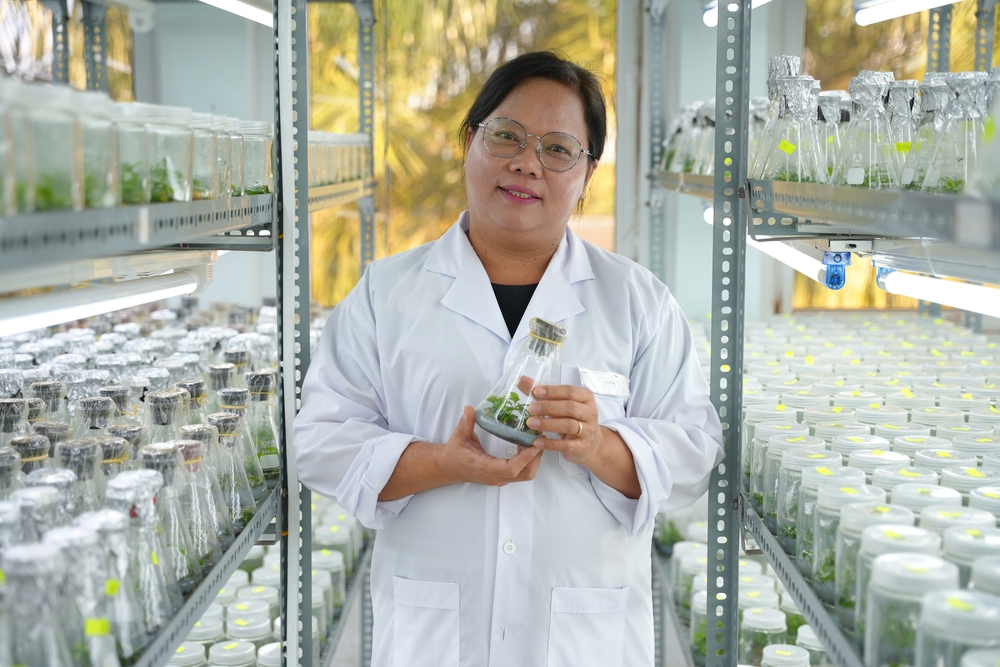
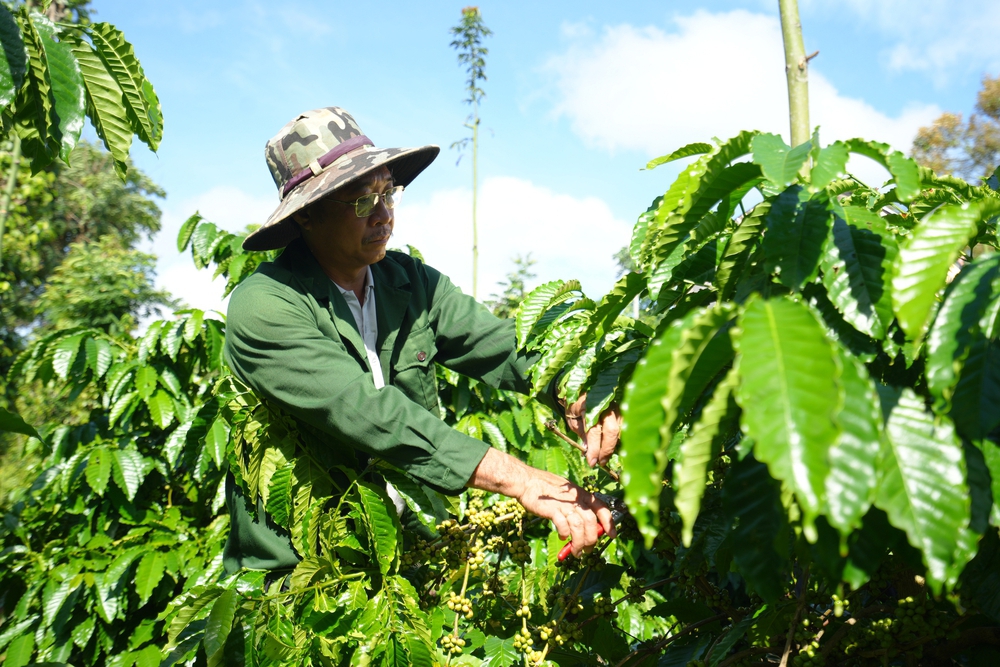
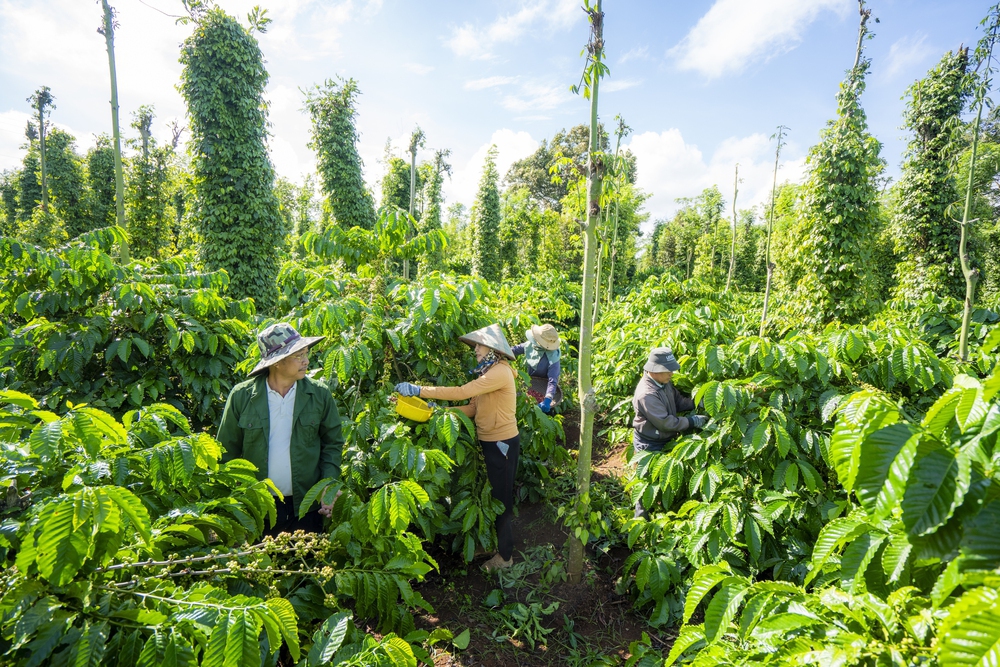
In addition to the goal of supporting farmers during their transition to sustainable farming, research collaboration and impact assessment activities are also critical focuses of the NESCAFÉ Plan, which include:
- Collaborative research and development activities with the Western Highlands Agriculture and Forestry Science Institute (WASI) to develop and distribute high-quality, climate-resilient coffee seedlings. This initiative has been in place since the program's inception. Over 74 million seedlings were distributed from 2011 to 2023, with an additional 12 million seedlings expected to reach farmers in 2024. This effort has facilitated the replanting of over 86,000 hectares of aging coffee plantations in the Central Highlands.
- Annual cooperation with the Rain Forest Alliance to produce the Program's Impact Assessment (M&E) Report.
Part 5
Achievements
Help Improve the Quality of Life and Livelihoods of Coffee Farmers
- Assist over 21,000 farming households in accessing and practicing coffee production according to the 4C criteria. This initiative has enabled households to increase their income by 30% to 150% through the application of reasonable intercropping models and cost-saving practices in coffee cultivation, such as water and fertilizer conservation. The program also supports seedlings for an average of 15,000 farmers annually (2011-2023).
- Distribute over 74 million disease-resistant, high-quality, and high-yielding seedlings, actively supporting the replanting of old coffee areas and the renovation of coffee gardens (2011-2023).
- Implement training on sustainable coffee cultivation and climate change adaptation. This training has improved knowledge and practices concerning occupational safety and health in coffee cultivation for over 355,000 farmers, with more than 35% of participants being female farmers (2011-2023).
- Establish 274 farmer groups, with 30% of group leaders being female, contributing to the enhancement of the role and position of female farmers.
- Support young farmers in starting businesses and improving soft skills in farm management, which contributes to building a new generation of farmers in the coffee industry. Currently, 34% of farmers participating in the Program are under 30 years old.
- Develop and implement a digital-based farm diary management tool (Digital Farmer Field Book - FFB) and the Koltitrace App, which assist farmers in managing their farm economy more effectively, replacing traditional paper management methods.
- Strengthen the connection and sharing of information and knowledge among the farming community through the Agrinest online information network, facilitating convenient and rapid sharing and easy access to information.
Promote Good Practices Towards Regenerative Agriculture. Help regenerate ecosystems while enhancing resilience and adaptation to climate change for coffee gardens, aiming to establish a sustainable, low-emission coffee industry.
- Renovate over 74,000 hectares of old coffee areas through the distribution of disease-resistant, high-yield, and high-quality seedlings (2011-2023).
- Save 40% to 60% of irrigation water by applying economical and efficient irrigation methods and techniques.
- Reduce chemical fertilizers and pesticides by 20%, replacing them with compost made from coffee husks and waste from poultry and livestock.
- Achieve yields that are 15% higher than the national average.
- Ensure that 86% of coffee gardens are intercropped with an average of three different crops.
- Employ appropriate intercropping methods to improve land use efficiency, protect soil quality and fertility, increase carbon absorption into the soil, reduce emissions to the environment, and preserve biodiversity.
- Implement the Agroforestry Project by intercroping 2.3 million trees (including timber and fruit trees) in coffee farms to absorb and store CO2, estimated at approximately 480,000 tons over a five-year period from 2023 to 2027, while enhancing biodiversity.
Build a Model for Chain Linkage to Enhance the Value of Vietnamese Coffee Beans
- By promoting the production of high-quality and sustainable coffee, the NESCAFÉ Plan contributes to completing the value chain in sustainable coffee production, from farmers to consumers, thereby increasing the value of Vietnamese coffee beans.
- Each year, Nestlé purchases 20% to 25% of Vietnam's coffee output, with an average total value of 700 million USD. This is primarily for deep processing for domestic consumption and export, with 100% of coffee meeting the criteria of the international 4C certification code. This acts as a driving force to promote certified production with traceability of Vietnamese coffee.
- All green coffee beans purchased from Vietnam are sourced from responsible, high-quality suppliers due to the sustainable farming techniques applied through the NESCAFÉ Plan. To date, Nestlé coffee products have been exported to nearly 30 countries and regions worldwide, including demanding markets such as Europe, the US, Australia, Japan, and South Korea.
Part 6
Model expansion potential
The NESCAFÉ Plan model is highly regarded for its replication potential, having achieved positive results across multiple dimensions, including technical guidance, management training, agricultural product purchasing, processing organization, and value chain distribution. Since its launch in 2011, the NESCAFÉ Plan in Vietnam has continuously expanded in scale, incorporating various additional and improved components over time.
Central to the NESCAFÉ Plan is its focus on farmers, considered a key factor in expanding the program's scope. Vietnam currently has over 18 million farming households, who are pivotal in taking actions to address climate change and promote sustainable development within the agricultural sector. As those who directly cultivate, care for crops and livestock, and harvest, increasing farmers' awareness of sustainable practices not only enhances their income but also accelerates the achievement of sustainable agriculture goals.
To date, the program has conducted training sessions for hundreds of thousands of coffee farmers. Notably, the NESCAFÉ Plan has established a network of nearly 300 farmer group leaders equipped with technical and economic knowledge, serving as vital extensions to help replicate effective and sustainable farming models and practices. Furthermore, the project emphasizes training for young farmers, nurturing the next generation to continue the development of regenerative agriculture through innovative farming practices and the integration of digital applications in household management.
Additionally, to ensure the successful NESCAFÉ Plan model can be replicated in other localities and regions, Nestlé actively shares experiences related to the program at various domestic and international industry events and sustainable development forums. The program has also welcomed numerous domestic and foreign delegations to visit and exchange experiences on-site over the years.
Amid environmental and social challenges, along with the increasingly severe impacts of climate change on agricultural production in general and the coffee industry in particular, there are also stringent legal regulations from export markets. Recently, the EU Supply Chain Monitoring Bill was introduced, mandating companies to self-manage their value chains to prevent human rights and environmental violations. Additionally, the EU Deforestation Reduction Regulation (EUDR) prohibits the import of seven commodity groups (coffee, palm oil, wood, rubber, beef, cocoa, and beans) into the EU if their production contributes to deforestation. In this context, the NESCAFÉ Plan, with its comprehensive and long-term action program, significantly aids farmers and partners in the coffee supply chain to prepare for the increasingly strict sustainable development requirements imposed by international markets. This highlights the positive impact of the program in creating a ripple effect throughout the coffee value chain, serving as a model for other agricultural sectors in Vietnam to reference and learn from.
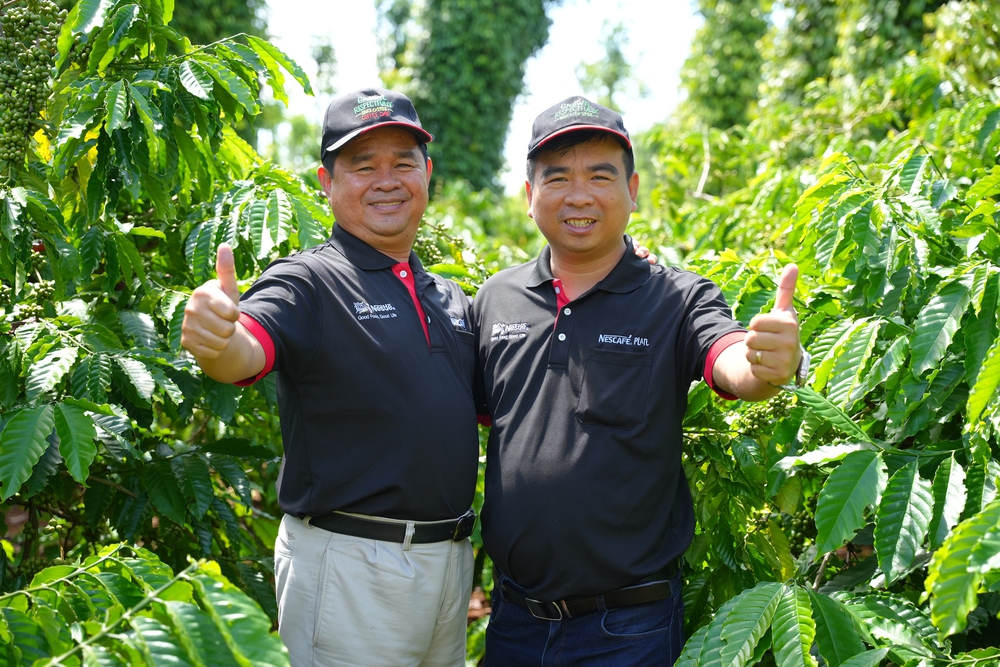
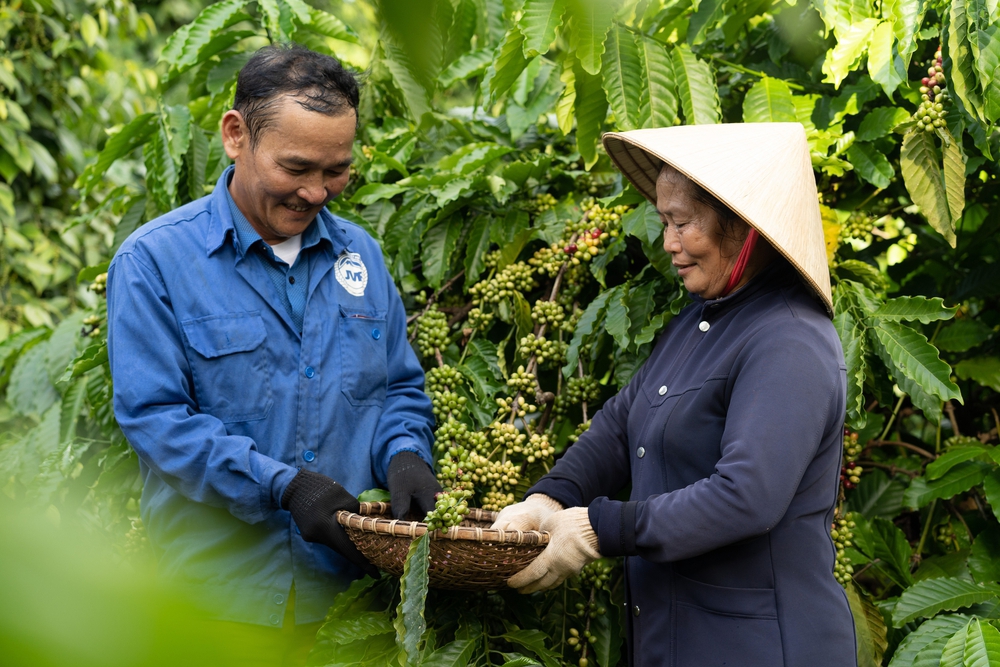
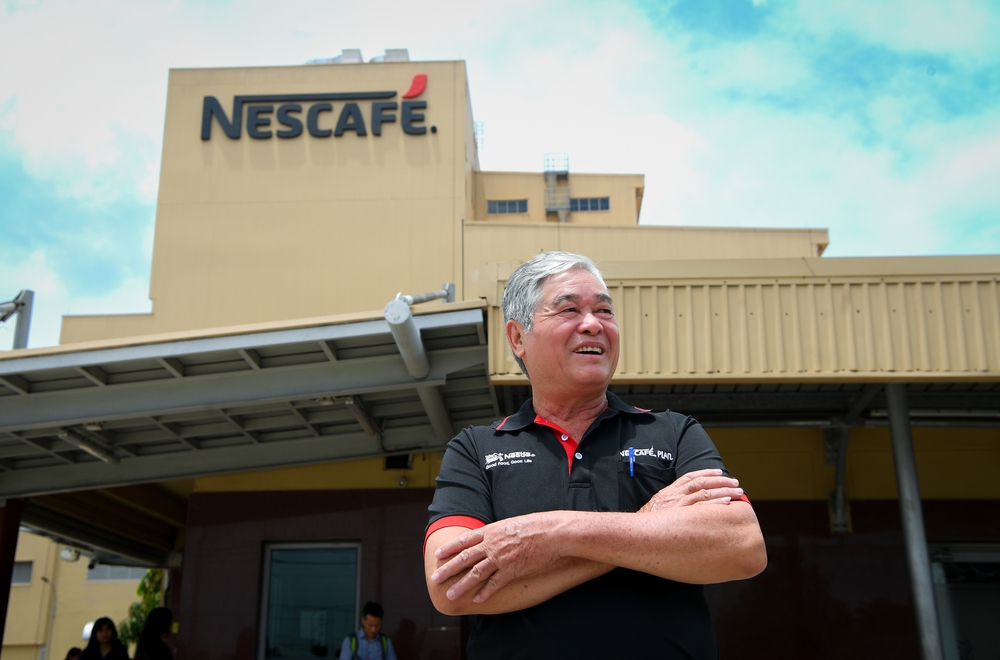
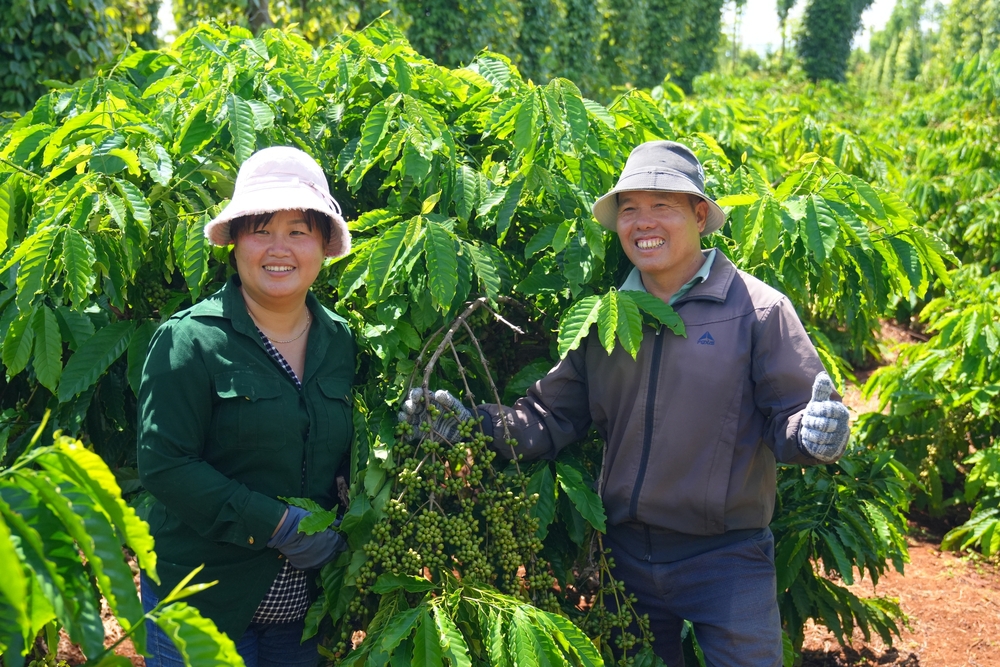
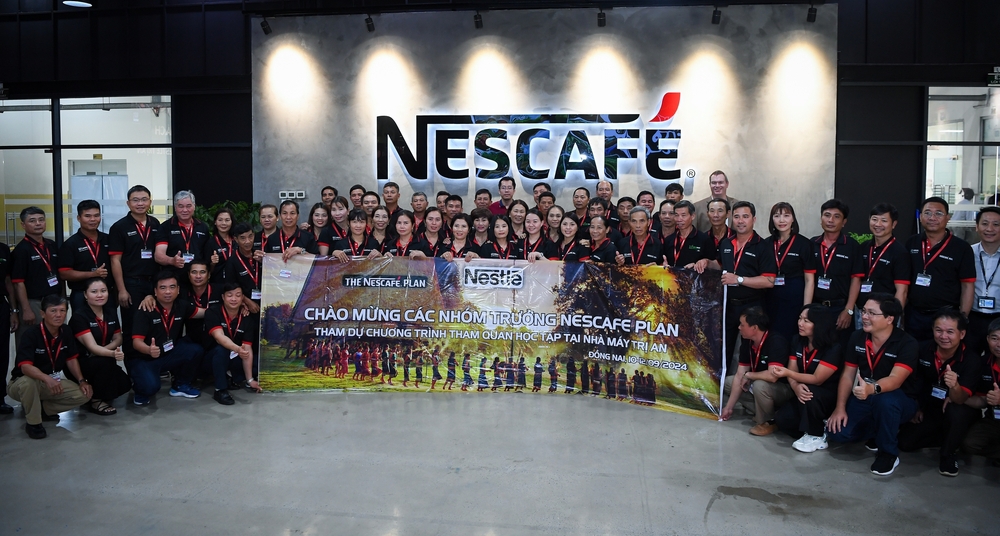
The images, videos, information and data about the project published on this landing page (project information page) are provided by the individual/organization who registered to participate in the award and are responsible for the copyright and legitimacy under the law.





